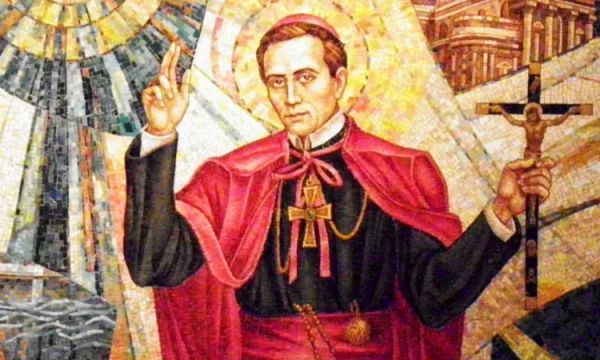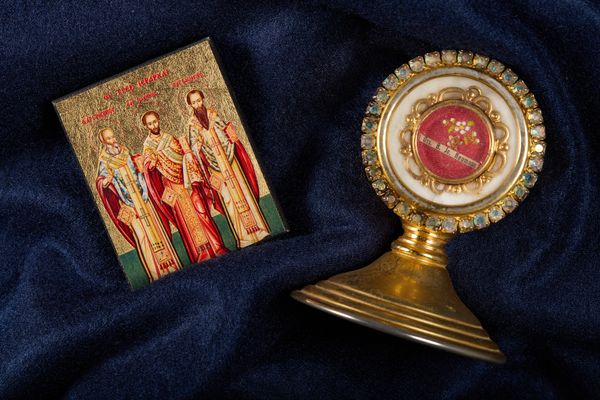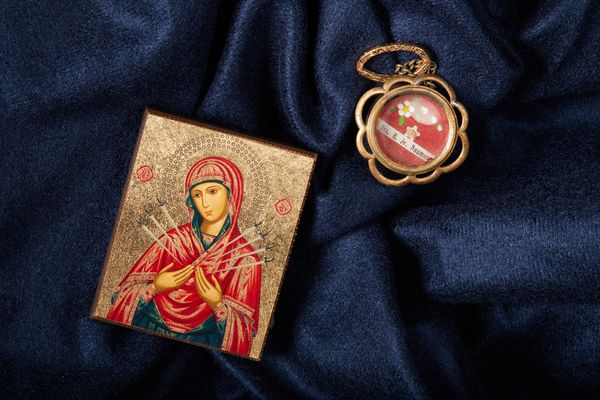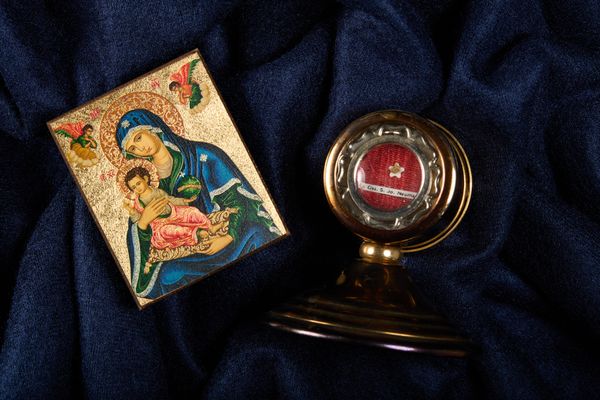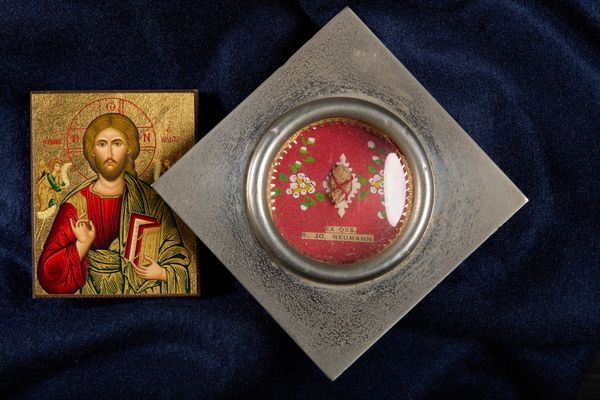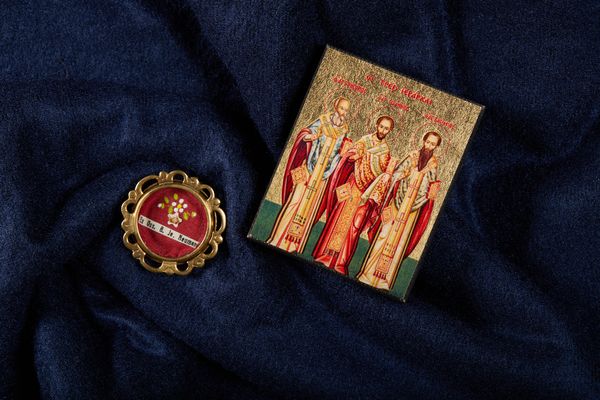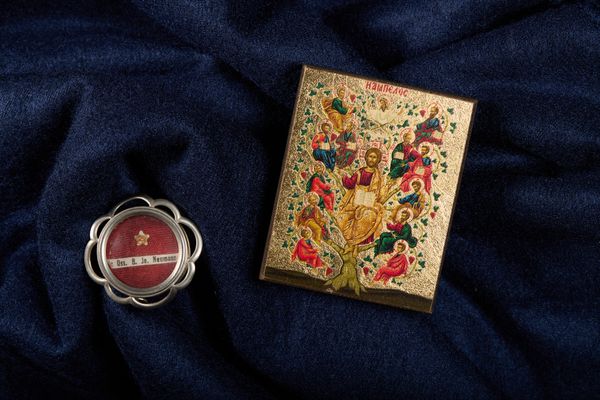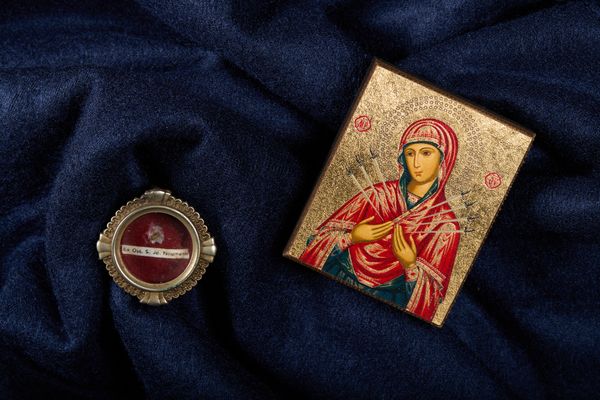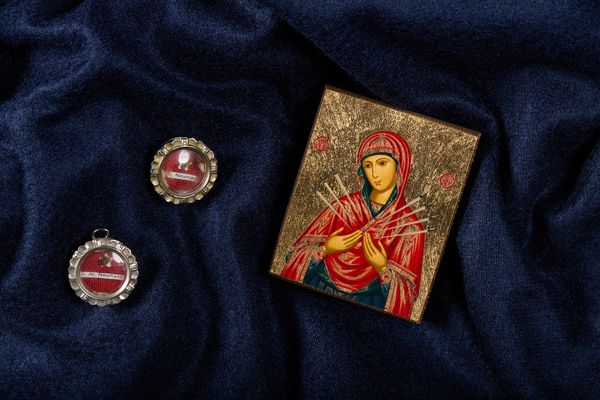John Nepomucene Neumann CSsR (German: Johann Nepomuk Neumann, Czech: Jan Nepomucký Neumann; March 28, 1811 – January 5, 1860) was a Catholic immigrant from Bohemia. He came to the United States in 1836, where he was ordained, joined the Redemptorist order, and became the fourth Bishop of Philadelphia in 1852. In Philadelphia, Neumann founded the first Catholic diocesan school system in the US. Canonized in 1977, he is the only male US citizen to be named a saint.
Bishop of Philadelphia
On February 5, 1852, the Holy See appointed Neumann Bishop of Philadelphia. His predecessor in that office, Francis Kenrick (who had become Archbishop of Baltimore), presided over the consecration on March 28, and Bishop Bernard O'Reilly assisted. The consecration was held in St. Alphonsus Church, Baltimore.
Philadelphia had a large and expanding Catholic immigrant population; Germans who fled the Napoleonic and other Continental wars had been followed by Irish fleeing the Great Famine caused by the potato blight and wars. Soon Italians and other southern and eastern European Catholics would arrive. Some settled in the diocese's rural parts, similar to the rural areas of New York state where Neumann had begun his ministry, but many stayed in the city. At the time, Philadelphia was one of the largest cities in the country.
It was an industrializing mercantile hub with many jobs for people with little command of the English language. The waves of immigration resulted in tensions in the city with native-born residents, who had to compete for work in difficult economic times. Anti-Catholic riots took place in the 1830s and 1844, in the Philadelphia Nativist Riots, occurring as Irish Catholics began to arrive in significant numbers in the city. Soon more riots occurred, mainly since the town was a stronghold of the Know-Nothing political party, known for its anti-immigrant and anti-Catholic prejudices. Bishop Neumann introduced the first Forty Hours Devotion at the Church of St. Philip Neri on May 26, 1853, the Feast of Corpus Christi, in honor of the church's patron, despite the hostility of the Know Nothings.
During Neumann's administration, new parish churches were completed at the rate of nearly one per month. To encourage savings and to support the financial needs of the Catholic community in Philadelphia, he directed the creation of a mutual savings bank, Beneficial Bank, in 1853. As many immigrants settled in close communities from their hometowns and with speakers of the same language, churches became associated with immigrants from particular regions. They were known as national parishes. Their parishioners often did not speak English or know how to obtain needed social services.
Neumann was particularly committed to providing educational opportunities to immigrant children. He became the first bishop to organize a diocesan school system, as Catholic parents wanted their children taught in the Catholic tradition. They feared Protestant influence and discrimination in public schools. Under his administration, the number of parochial schools in his diocese increased from one to 200. His 1852 catechisms became standard texts.
Neumann's fluency in several languages endeared him to the many new immigrant communities in Philadelphia. As well as ministering to newcomers in his native German, Neumann also spoke Italian fluently. A growing congregation of Italian-speakers received pastoral care in his private chapel, and Neumann eventually established in Philadelphia the first Italian national parishes in the country.
Neumann actively invited religious institutes to establish new houses within the diocese to provide necessary social services. In 1855, Neumann supported the foundation of a congregation of religious sisters in the city, the Sisters of St. Francis of Philadelphia. He brought the School Sisters of Notre Dame from Germany to assist in religious instruction and staff an orphanage. He also intervened to save the Oblate Sisters of Providence from dissolution; this congregation of African-American women was founded by Haitian refugees in Baltimore.
The large diocese was not wealthy, and Neumann became known for his personal frugality. He kept and wore only one pair of boots throughout his residence in the United States. When given a new set of vestments as a gift, he would often use them to outfit the newest ordained priest in the diocese. Discouraged by conflict as well as anti-Catholic riots and arson of religious buildings, Neumann wrote to Rome asking to be replaced as bishop, but Pope Pius IX insisted that he continue.
Credits:
Discriptions of saints lives and biographies have been excerpted, summarized, or compiled from
Franciscan Media,
CatholicSaints.Info,
Catholic Online, and
Wikipedia.
